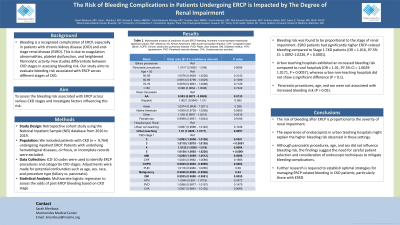Monday Poster Session
Category: Interventional Endoscopy
P2771 - The Risk of Bleeding Complications in Patients Undergoing ERCP is Impacted by the Degree of Renal Impairment
Monday, October 28, 2024
10:30 AM - 4:00 PM ET
Location: Exhibit Hall E

Has Audio

Sarah Meribout, MD
Maimonides Medical Center
Brooklyn, NY
Presenting Author(s)
Sarah Meribout, MD1, Anis L. Meribout, MD2, Ahmed E. Salem, MBBCh1, Carla Barberan Parraga, MD3, Kundan Jana, MBBS1, Kamal Hassan, MD4, Mohammed Abusuliman, MD5, Islam B Mohamed, MD6, Aaron Z. Tokayer, MD, MHS1, Anthony Kalloo, MD7
1Maimonides Medical Center, Brooklyn, NY; 2University of Constantine 3, Abu Dhabi, Abu Dhabi, United Arab Emirates; 3Maimonides Medical Center, New York, NY; 4New York-Presbyterian/Queens, New York, NY; 5Henry Ford Health, Detroit, MI; 6Cleveland Clinic Foundation, Cleveland, OH; 7Johns Hopkins University School of Medicine, Baltimore, MD
Introduction: Endoscopic retrograde cholangiopancreatography (ERCP) has advanced into a critical therapeutic intervention for various biliary and pancreatic conditions, including tumors, choledocholithiasis, pancreatic pseudocysts, and postoperative biliary complications. Despite technological advancements, ERCP-related complications, particularly bleeding, remain significant concerns. It is well-established that CKD and ESRD patients have an increased risk of bleeding after procedures due to coagulation abnormalities, platelet dysfunction, and heightened fibrinolytic activity. While a few studies have shown increased bleeding risks in CKD and ESRD patients undergoing ERCP, no study has compared the bleeding incidence among different CKD stages. This study aims to evaluate the risk of bleeding associated with ERCP across different CKD stages and identify factors contributing to this risk.
Methods: We conducted a retrospective analysis using the National Inpatient Sample (NIS) database from 2016 to 2019, including 9,764 patients with impaired renal function who underwent inpatient ERCP. Patients with underlying haematological diseases and cirrhosis were excluded to minimize confounding factors related to bleeding tendencies. We analyzed demographic information, health insurance status, hospital type, and procedural details to determine bleeding risks.
Results: Bleeding risk was found to be proportional to the stage of renal impairment. ESRD patients had significantly higher ERCP-related bleeding compared to Stage 1 CKD patients (OR = 1.016, 97.5% CI: 1.0092-1.0226, P < 0.0001). Urban teaching hospitals exhibited an increased bleeding risk compared to rural hospitals (OR = 1.01, 97.5% CI = 1.0029-1.0171, P = 0.0057), whereas urban non-teaching hospitals did not show a significant difference (P = 0.1). Pancreatic procedures, age, and sex were not associated with increased bleeding risk (P > 0.05).
Discussion: The risk of bleeding after ERCP is proportional to the severity of renal impairment. The experience of endoscopists in urban teaching hospitals might explain the higher bleeding risk observed in these settings. Although pancreatic procedures, age, and sex did not influence bleeding risk, the findings suggest the need for careful patient selection and consideration of endoscopic techniques to mitigate bleeding complications. Further research is required to establish optimal strategies for managing ERCP-related bleeding in CKD patients, particularly those with ESRD.
Note: The table for this abstract can be viewed in the ePoster Gallery section of the ACG 2024 ePoster Site or in The American Journal of Gastroenterology's abstract supplement issue, both of which will be available starting October 27, 2024.
Disclosures:
Sarah Meribout, MD1, Anis L. Meribout, MD2, Ahmed E. Salem, MBBCh1, Carla Barberan Parraga, MD3, Kundan Jana, MBBS1, Kamal Hassan, MD4, Mohammed Abusuliman, MD5, Islam B Mohamed, MD6, Aaron Z. Tokayer, MD, MHS1, Anthony Kalloo, MD7. P2771 - The Risk of Bleeding Complications in Patients Undergoing ERCP is Impacted by the Degree of Renal Impairment, ACG 2024 Annual Scientific Meeting Abstracts. Philadelphia, PA: American College of Gastroenterology.
1Maimonides Medical Center, Brooklyn, NY; 2University of Constantine 3, Abu Dhabi, Abu Dhabi, United Arab Emirates; 3Maimonides Medical Center, New York, NY; 4New York-Presbyterian/Queens, New York, NY; 5Henry Ford Health, Detroit, MI; 6Cleveland Clinic Foundation, Cleveland, OH; 7Johns Hopkins University School of Medicine, Baltimore, MD
Introduction: Endoscopic retrograde cholangiopancreatography (ERCP) has advanced into a critical therapeutic intervention for various biliary and pancreatic conditions, including tumors, choledocholithiasis, pancreatic pseudocysts, and postoperative biliary complications. Despite technological advancements, ERCP-related complications, particularly bleeding, remain significant concerns. It is well-established that CKD and ESRD patients have an increased risk of bleeding after procedures due to coagulation abnormalities, platelet dysfunction, and heightened fibrinolytic activity. While a few studies have shown increased bleeding risks in CKD and ESRD patients undergoing ERCP, no study has compared the bleeding incidence among different CKD stages. This study aims to evaluate the risk of bleeding associated with ERCP across different CKD stages and identify factors contributing to this risk.
Methods: We conducted a retrospective analysis using the National Inpatient Sample (NIS) database from 2016 to 2019, including 9,764 patients with impaired renal function who underwent inpatient ERCP. Patients with underlying haematological diseases and cirrhosis were excluded to minimize confounding factors related to bleeding tendencies. We analyzed demographic information, health insurance status, hospital type, and procedural details to determine bleeding risks.
Results: Bleeding risk was found to be proportional to the stage of renal impairment. ESRD patients had significantly higher ERCP-related bleeding compared to Stage 1 CKD patients (OR = 1.016, 97.5% CI: 1.0092-1.0226, P < 0.0001). Urban teaching hospitals exhibited an increased bleeding risk compared to rural hospitals (OR = 1.01, 97.5% CI = 1.0029-1.0171, P = 0.0057), whereas urban non-teaching hospitals did not show a significant difference (P = 0.1). Pancreatic procedures, age, and sex were not associated with increased bleeding risk (P > 0.05).
Discussion: The risk of bleeding after ERCP is proportional to the severity of renal impairment. The experience of endoscopists in urban teaching hospitals might explain the higher bleeding risk observed in these settings. Although pancreatic procedures, age, and sex did not influence bleeding risk, the findings suggest the need for careful patient selection and consideration of endoscopic techniques to mitigate bleeding complications. Further research is required to establish optimal strategies for managing ERCP-related bleeding in CKD patients, particularly those with ESRD.
Note: The table for this abstract can be viewed in the ePoster Gallery section of the ACG 2024 ePoster Site or in The American Journal of Gastroenterology's abstract supplement issue, both of which will be available starting October 27, 2024.
Disclosures:
Sarah Meribout indicated no relevant financial relationships.
Anis Meribout indicated no relevant financial relationships.
Ahmed Salem indicated no relevant financial relationships.
Carla Barberan Parraga indicated no relevant financial relationships.
Kundan Jana indicated no relevant financial relationships.
Kamal Hassan indicated no relevant financial relationships.
Mohammed Abusuliman indicated no relevant financial relationships.
Islam B Mohamed indicated no relevant financial relationships.
Aaron Tokayer indicated no relevant financial relationships.
Anthony Kalloo: Colowrap – Advisory Committee/Board Member, Owner/Ownership Interest. GI Scientific – Advisor or Review Panel Member, Owner/Ownership Interest.
Sarah Meribout, MD1, Anis L. Meribout, MD2, Ahmed E. Salem, MBBCh1, Carla Barberan Parraga, MD3, Kundan Jana, MBBS1, Kamal Hassan, MD4, Mohammed Abusuliman, MD5, Islam B Mohamed, MD6, Aaron Z. Tokayer, MD, MHS1, Anthony Kalloo, MD7. P2771 - The Risk of Bleeding Complications in Patients Undergoing ERCP is Impacted by the Degree of Renal Impairment, ACG 2024 Annual Scientific Meeting Abstracts. Philadelphia, PA: American College of Gastroenterology.
